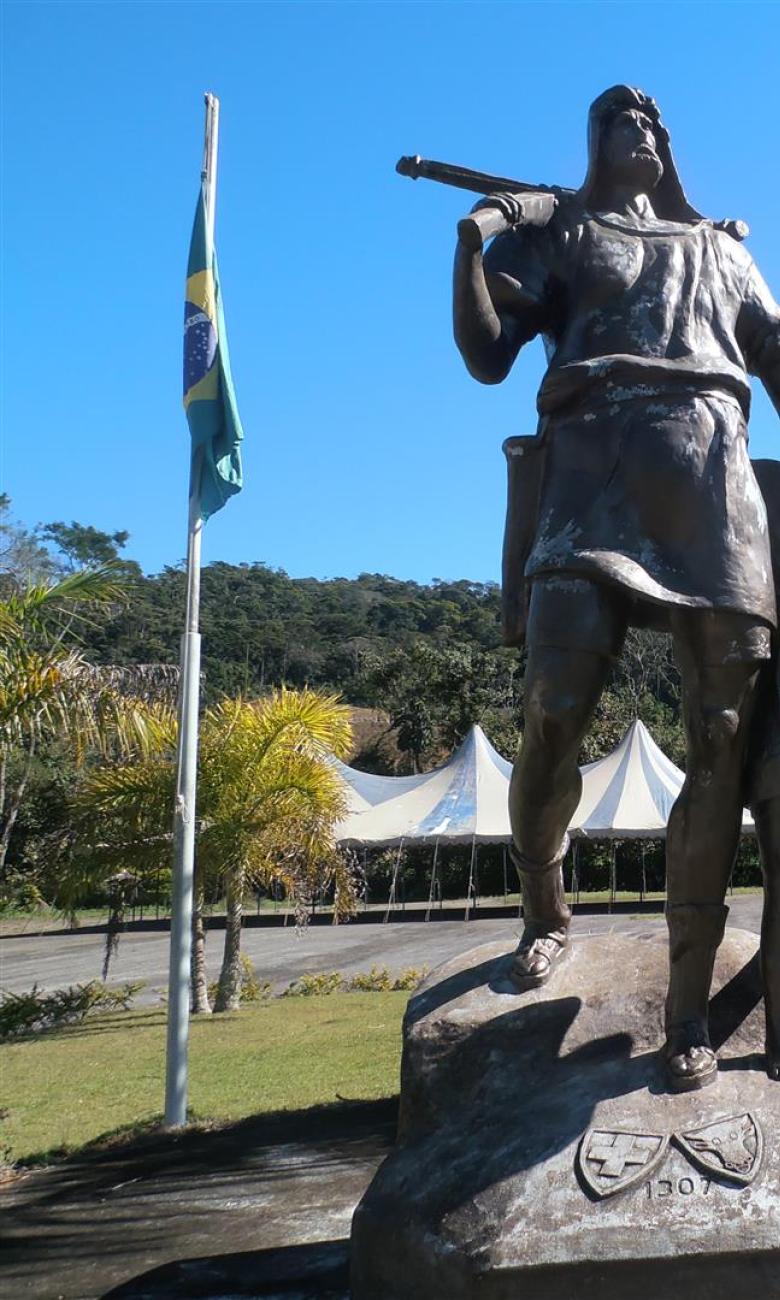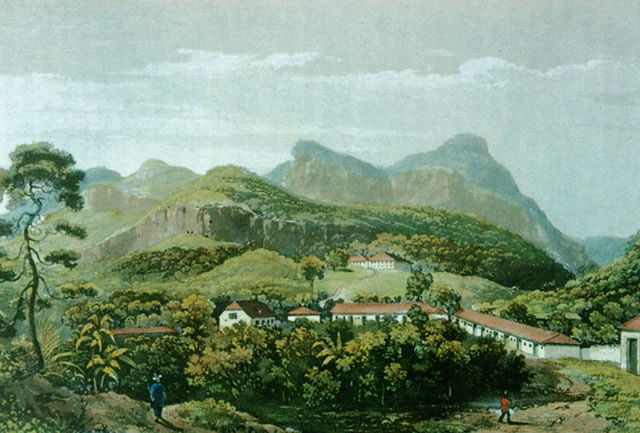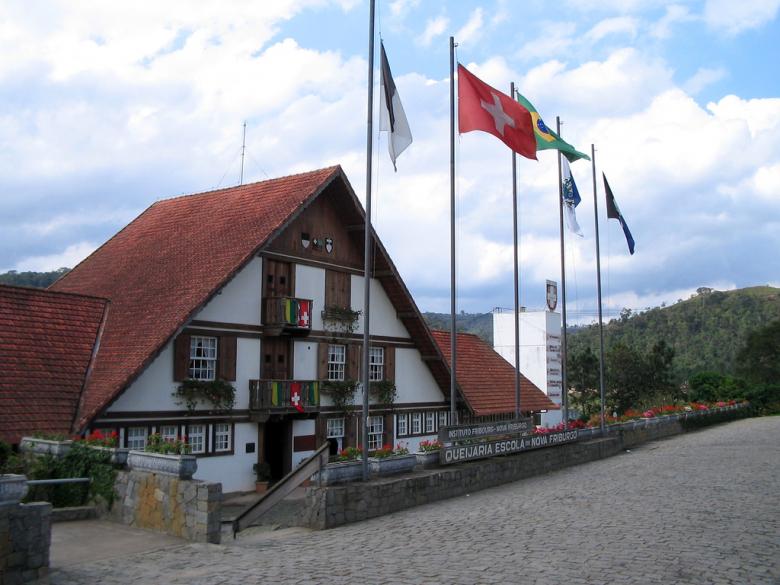A Swiss city in the heart of Brazil
In the uplands of Serra Fluminense, 130km from the beaches of Rio de Janeiro, lies a city of 185,000 people. Proud of its Swiss heritage, Nova Friburgo is getting ready to celebrate with great fanfare the 200th anniversary of its foundation. Numerous initiatives on both sides of the Atlantic will strengthen existing ties between Nova Friburgo and Switzerland.
In September of last year, the governor of the State of Rio de Janeiro conferred the status of 'Swiss city' on Nova Friburgo. He took this strong symbolic step in recognition of the deep ties between Nova Friburgo and Switzerland.
Founded by decree of King John VI of Portugal on 16 May 1818, Nova Friburgo's destiny is inextricably linked to the families of the Swiss emigrants who helped to build it. Exchanges between Fribourg and Nova Friburgo have further strengthened these ties in recent decades. In order to celebrate the anniversary in style and create new synergies between the two cities, a series of initiatives are being launched in 2018.
While the focus of the initiatives is on young people and the future in particular, Nova Friburgo's unique history is also being remembered. At the beginning of the 19th century, Switzerland was, along with Portugal, the first nation to organise the migration of large groups of people to Brazil. In Europe, Brazil was seen as a promising New World far from the problems that afflicted the Old World.

The king's decree
The history of Nova Friburgo began with a decree promulgated by King John VI of Portugal on 16 May 1818. An agricultural colonisation agreement was concluded with the government of Fribourg, paving the way for the immigration of 100 Swiss families to Brazil.
At the beginning of the 19th century, the Swiss were predominantly a farming people who excelled at making a living from the land. But in 1816, a year that would come to be known as the 'year without a summer', much of Europe including Switzerland suffered severe unseasonal periods of cold and rain following the eruption of Mount Tambora in Indonesia a year earlier. Crops failed and poverty, hunger and death followed soon after.

A heroic voyage
In July 1819, a first contingent of 2,006 people boarded ships in Estavayer-le-Lac in the canton of Fribourg for what was to them a new world. The 830 emigrants from the canton of Fribourg were joined by 500 countrymen from the Jura region (then part of the canton of Bern), 160 from the canton of Valais, 143 from Aargau, 140 from Lucerne, 118 from Solothurn, 90 from Vaud, 17 from Schwyz, five from Neuchâtel and three from Geneva. For the first stage of their journey, the emigrants travelled down the Aare and the Rhine to the Netherlands, where they had to wait six weeks in cramped, malarial camps before embarking for Brazil. Some members of the first group of emigrants died without having seen the sea.
In September 1819, the emigrants finally saw the Atlantic Ocean. It was a long voyage. It took the first ship 55 days to cross the Atlantic, and the last of the seven ships put in at Rio de Janeiro after 146 days. The Atlantic crossing was fraught with hardship, illness and accidents, claiming the lives of 400 emigrants.
The survivors of the voyage met at the end of 1819 in Rio the Janeiro, where they stayed until they had regained their strength. They then continued their journey on foot across tropical forests, arriving at their promised destination on 17 April 1820. Having named their new home 'New Fribourg', giving birth to Nova Friburgo, they established a municipal authority, set up improvised places of worship and founded the town's first school. In 1821, the Philanthropic Association of Rio de Janeiro was formed to support the most vulnerable families.

© Flickr Marcusrg
Difficult beginnings
The settlers' dreams of rich harvests ran up against a stark reality. Turning the virgin forest into alpine pastures proved much more difficult than they had expected. Some settlers decided to move on to areas with better agricultural potential, where they began to grow coffee. The subsequent expansion of the coffee trade would ensure the future sustainability of Nova Friburgo, which became a strategic point on the trade route between the coffee plantations in the hinterland and Rio de Janeiro, then the country's capital and biggest seaport.
Over the following decades, the region also welcomed other immigrant communities, making Nova Friburgo a melting pot of people from all parts of the world. 'City of all nations' is now Nova Friburgo's motto. The city's main square proudly displays the flags of the countries of origin of the immigrant communities, known as 'colonies', that have shaped its destiny: Portugal since the country was first colonised in the 16th century, Switzerland (from 1820), Germany (1824), Italy (1855), Lebanon (1870), Spain (late 19th century), Japan (1908), Austria (1928) and Hungary (1956). Among them is a pan-African flag honouring the African slaves who were brought from Africa beginning in the 18th century.
Distant relations
Over time, most families in Novo Friburgo lost their cultural identification with Switzerland. The Swiss authorities also seemed to have largely forgotten the descendants of the few hundred Swiss families who first emigrated to a distant land.
This changed in 1973, when the University of Fribourg published a doctoral thesis by a newly minted historian, Martin Nicoulin, on the odyssey of the first Swiss settlers of Nova Friburgo in the early 19th century ('La Genèse de Nova Friburgo. Emigration et colonisation suisse au Brésil, 1817–1827'). Renewed interest led to the creation, in 1978, of the Fribourg-Nova Friburgo Association, whose stated aim was to provide support for the people of Nova Friburgo and keep alive the memory of Swiss migration to Brazil. Links were further strengthened in 1981, when a delegation from Nova Friburgo was invited to join a parade to celebrate the 500th anniversary of the canton of Fribourg's incorporation into the Swiss Confederation.
A forward-looking, vibrant city
Nova Friburgo has 185,000 inhabitants – a slight majority of whom are female (52%) – and is divided into eight districts. Because Nova Friburgo was predominantly colonised by European immigrants, today 72% of its inhabitants are white, making it the least ethnically mixed city in the state of Rio de Janeiro. The city's location in the uplands of the Serra Fluminense – its highest point being at 850m above sea level – also gives it the coolest climate in the state.
The economic crisis forced the city to rethink its economic base, which is mainly centred on the textile and metallurgy industries. Agriculture and horticulture are also important sectors. Nova Friburgo is now known as Brazil's capital of lingerie manufacturing, strawberry growing and trout farming. The region's unspoiled natural beauty has also turned tourism – mainly domestic – into a thriving local industry. Travellers in search of adventure and excitement will not be disappointed in this city, which offers ample opportunities for ecotourism and outdoor sports.
In recent decades Nova Friburgo, which has traditionally been known as an industrial city, has also taken active steps to become better known as a centre of learning, and has thereby successfully attracted a younger population. Several higher education institutions have been established, opening up a wider range of opportunities for young people. Today, the city has six universities: three private universities, a campus of Federal Fluminense University, a campus of the Federal Center for Technological Education Celso Suckow da Fonseca and a campus of Rio de Janeiro State University.
An anniversary celebrated in style
To mark the bicentenary of the founding of the city of Nova Friburgo, the Swiss government has launched a series of events sponsored by the President of the Swiss Confederation, Federal Councillor Alain Berset, a native of Fribourg. The programme, which aims to further strengthen the strong existing ties between Switzerland and Nova Friburgo and create new, lasting synergies, is being organised by the FDFA's Presence Switzerland in consultation with the network of Swiss representations in Brazil. Ensuring Switzerland's continued visibility in Brazil is essential.
Combining tradition and modernity, the programme therefore aims to present an image of a country that honours its past and the history of its emigrants but also embraces the present and is ready to show, without false modesty, its boldness, dynamism and positive spirit. The projects organised this year will focus on the following areas:
History and education project: pupils in state schools will conduct independent research on the history of Swiss migration and put on a play on the same topic.
Swiss cuisine project: two Swiss chefs from the canton of Fribourg, Ben and Léo, will give gastronomy courses at Candido Mendes University, create a special menu for the bicentenary celebration at the Swiss House of Nova Friburgo, and create a craft beer to mark the occasion.
What better way to tell the story of a relationship that goes back two centuries than through images? An exchange programme launched by the Lausanne University of Art and Design (ECAL) is designed to do just that. In October 2017, ECAL sent ten students to Nova Friburgo to fully immerse themselves in Brazilian culture. In exchange, four young film-makers from Nova Friburgo have come to Switzerland to make four short films. This audiovisual project will also feature two short documentary films on the Swiss House of Nova Friburgo and the Philanthropic Association of Rio de Janeiro, which was founded in 1821. A series of profiles of the descendants of Swiss emigrants will also be produced and published on various social media platforms.
The teaching of French has gradually been abandoned in the city's state schools, and German is no longer spoken by the descendants of the early Swiss settlers. Specially designed programmes will celebrate both languages in Nova Friburgo this year.
Cultural exchanges between the two countries will take place throughout 2018, including a concert by Fribourg classical pianist Raphaël Sudan and electronic music curated by a Swiss DJ in Brazil and a Brazilian DJ in Switzerland. Swiss cinema will also be showcased, with screenings of Swiss films throughout the year and a special programme of the best films for children and people of all ages made by film-makers from Fribourg in the last few decades. There will also be a tribute to three famous sons of Fribourg, the painter and sculptor Jean Tinguely, the Formula One racer Jo Siffert and composer and Catholic priest Joseph Bovet.
What better way than sport to bring together people of different nations? The 2018 World Cup match between Switzerland and Brazil will be a perfect opportunity to show that the friendship between our two nations is stronger than a football match. The Swiss flag will also be flying at this year's Nova Friburgo Mountain Bike Cup, an event that has become a local tradition.
The bicentenary is also an opportunity to exploit synergies in business, trade and tourism as well as science and technology.
Happy birthday Nova Friburgo! May the bonds of friendship between our two countries grow even stronger in the next two centuries. Congratulations!
Useful links:
La genèse de Nova Friburgo (the birth of Nova Friburgo), by Martin Nicoulin
Un aller simple pour Nova Friburgo, by Henrique Bon, French translation by Robert Schuwey of the Portuguese original, published by Faim de siècle




